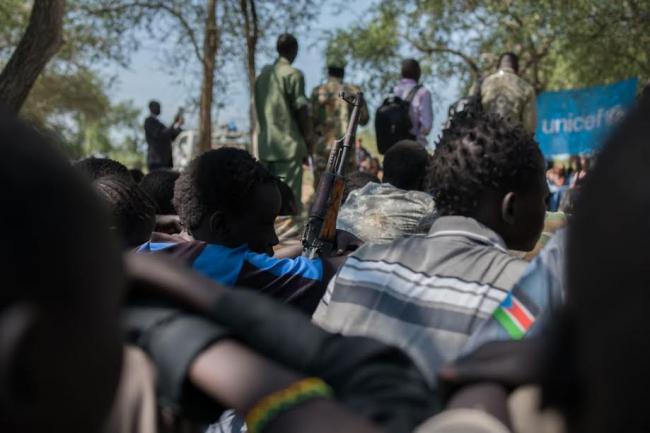16 Dec 2016, 07:05 am Print

“Since the first day of this conflict, children have been the ones most devastatingly affected by the violations,” said Leila Gharagozloo-Pakkala, UNICEF’s Regional Director for Eastern and Southern Africa.
“Now, as the fighting intensifies – and despite repeated pledges by all to end child recruitment – children are once again being targeted,” she added.
The Sudan People’s Liberation Army (SPLA) and SPLA in Opposition have both signed agreements with the UN in order to end and prevent the recruitment and use of children in the conflict.
So far, 1,932 children have been released by armed forces: 1,755 in 2015 and 177 this year.
Nonetheless, UNICEF reports that violations against children have continued to occur since 2013, including 2,342 who have been killed or maimed, 3,090 who have been abducted, and 1,130 sexually assaulted. There have also been 303 attacks or military use of schools and hospitals.
Since November, the UN has documented at least 50 children who have been abducted and recruited in the Greater Upper Nile region. Additional reports indicate that another 50 have been recruited in the Greater Bahr el Ghazal region and that violations against children have occurred in the Greater Equatorias area, but due to the high level of insecurity and restricted access, the UN has been unable to verify such claims.
In addition to the ongoing armed conflict, South Sudan is suffering an economic crisis that has brought inflation to more than 800 per cent, leading to widespread food insecurity and childhood malnutrition at emergency levels throughout most of the country.
UNICEF and its partners have treated 184,000 children with severe cases of malnutrition this year – an increase of 50 per cent from last year and more than 135 per cent higher from 2014.
“UNICEF’s concern is that with the prospect of increased hostilities and atrocities, the suffering that children have endured will have no end,” said Gharagozloo-Pakkala. “The children of South Sudan must no longer live under constant fear of hunger or conflict. They need sustained peace, care and support.”
South Sudan has faced ongoing challenges since a political face-off between President Salva Kiir and his Vice-President Riek Machar erupted into full blown conflict in December 2013. The crisis has produced one of the world's worst displacement situations with immense suffering for civilians.
Despite the August 2015 peace agreement that formally ended the war, conflict and instability have also spread to previously unaffected areas in the Greater Equatoria and Greater Bahr-El-Ghazal regions of South Sudan.
The UN Mission in South Sudan, known as UNMISS, has been operating in the country since 2011. Just hours before it was set to expire, the Security Council this evening voted unanimously to extend the Mission’s mandate for one day and is expected to come back to the matter tomorrow afternoon.
Photo: UNICEF/Charles Lomodong
- Balochistan erupts, Islamabad points finger at India — MEA hits back
- Pakistan: BLA claims 80 security personnel killed in coordinated Balochistan attacks
- Massive terror blitz in Pakistan: 10 security personnel, 58 militants killed in Balochistan
- Dance, music — then death: Suicide blast rips through wedding in Pakistan
- Baloch leader slams Pakistan’s Gaza peace role, says country 'deserves' Operation Sindoor 2.0





-1763561110.jpg)
